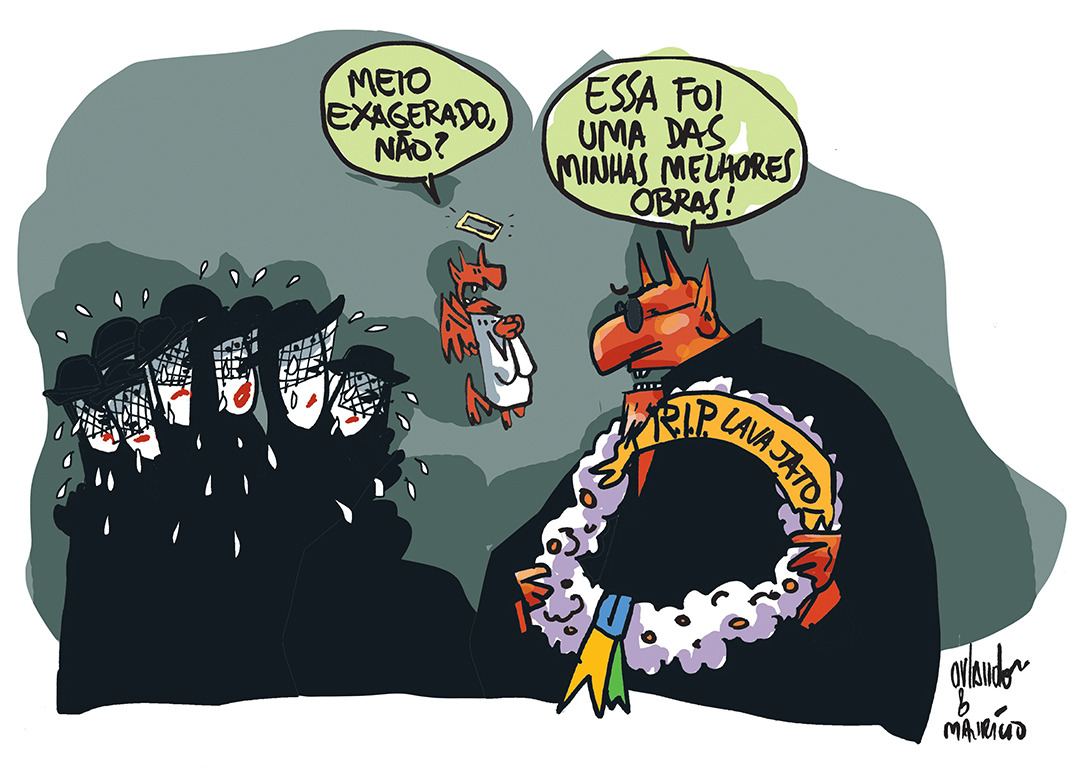The widows of Car Wash

"The evil that is committed doesn't surprise us any more than the good. Human stupidity, yes, that always amazes us"
Albert Camus
With each passing day, more atrocities and crimes committed by the Lava Jato prosecutors, led by former judge Sergio Moro, come to light.
Last week, Novonor, the new name for Odebrecht, filed a request with the Federal Supreme Court (STF) to annul the fine established in its leniency agreement, following a decision to the same effect already granted by the STF in the case of J&F. The request should be granted, since the argument used by J&F to obtain a favorable decision was the threats and embarrassment suffered by Odebrecht itself.
In its request to annul the fine, Novonor lists a series of transcripts of messages exchanged between Lava Jato prosecutors and former judge Moro that would make anyone want to vomit. The prosecutors force the collaborators to change lawyers because they are "too combative" and thus influence the defense of the defendants, as well as making clear threats to the company, its executives and their families. In one part of the conversation, they consider arresting someone close to a collaborator to force him to change lawyers. They also consider arresting the owner to break up the company once and for all. This is only part of the material that has been made available.
Without pretending to be exhaustive, the crimes committed by the Car Wash prosecutors, which have been disclosed so far, include: illegal wiretapping in prison, illegal wiretapping of lawyers, blackmail to change lawyers, threats to imprison family members, illegal arrests, mandatory waiver of defense in court proceedings, non-compliance with court orders, leaking of confidential information, disclosure of illegal wiretapping, lawfare, illegal constraint, criminal organization, threat to murder a STF minister, illegal obtaining of information from abroad, administrative improbity, misuse of office. The list goes on and on. They are tenants of the penal code. They frequent almost all the crimes typified in the code.
With all this exposed, we still find those who belittle these crimes. Some are card-carrying fascists. But it's amazing how part of the mainstream media (supporters of the 1964 coup) still "passes the buck" and resents the end of this dark chapter, the embryo of the attack on democracy on January 8, 2023. They call these crimes slips, deviations, mistakes, abuses, as if to impute little relevance to them.
The newspaper O Globo, for example, published an editorial on the 17th of this month under the headline "There should be no pardon for Odebrecht fines". In the text - what a paradox - it says that "if the justification is questionable for J&F, using it for Odebrecht would be completely out of place". How so? The argument used by J&F to get the fine canceled was the embarrassment suffered by Odebrecht - the company most affected by the torture of the Republic of Curitiba.
To those who maintain that the end justifies the means, I would remind you that throughout history we have seen countless cases of crimes perpetrated in the name of noble causes. Wars, genocides and oppressions have taken place under justifications such as nationalism, religion or political ideologies.
These tragedies highlight the legal, moral and ethical complexity that arises when noble principles are distorted to justify unacceptable acts.

In the case of Car Wash, it is already clear that the supposed fight against corruption was the justification for the project of power and enrichment of its members with the support of part of the media, and it has brought much more harm than good to the country.
A report by the Institute for Strategic Studies in Oil, Gas and Biofuel (INEEP) points out that in the first year alone, Lava Jato removed around R$42 billion from the Brazilian economy, promoting the "dismantling of important sectors of the national economy". Economists are unanimous in recognizing that Lava Jato has boosted unemployment in the country. The shipbuilding industry alone has lost more than 50,000 jobs. Odebrecht alone has reduced its workforce from almost 200,000 to just under 30,000. What's more, the amounts to be returned to Petrobras, around R$6 billion, do not compare with the fine that the company paid in the US court of around US$3 billion. In other words, the operation, which turned out to be the most corrupt in the judiciary, shook the Brazilian economy, generated high levels of unemployment and culminated in high payments to the Americans.
The past conduct of the Brazilian business and political sectors needs to be rediscussed and framed in the correct light of a practice that is no longer tolerated, and the state needs to correct its errors and omissions.
Novonor and the other companies affected by the coercion have an obligation to expose the atrocities to which the company and its executives were subjected. The request to annul the fine is a natural consequence of a flawed agreement. You can't annul what is already null and void.


